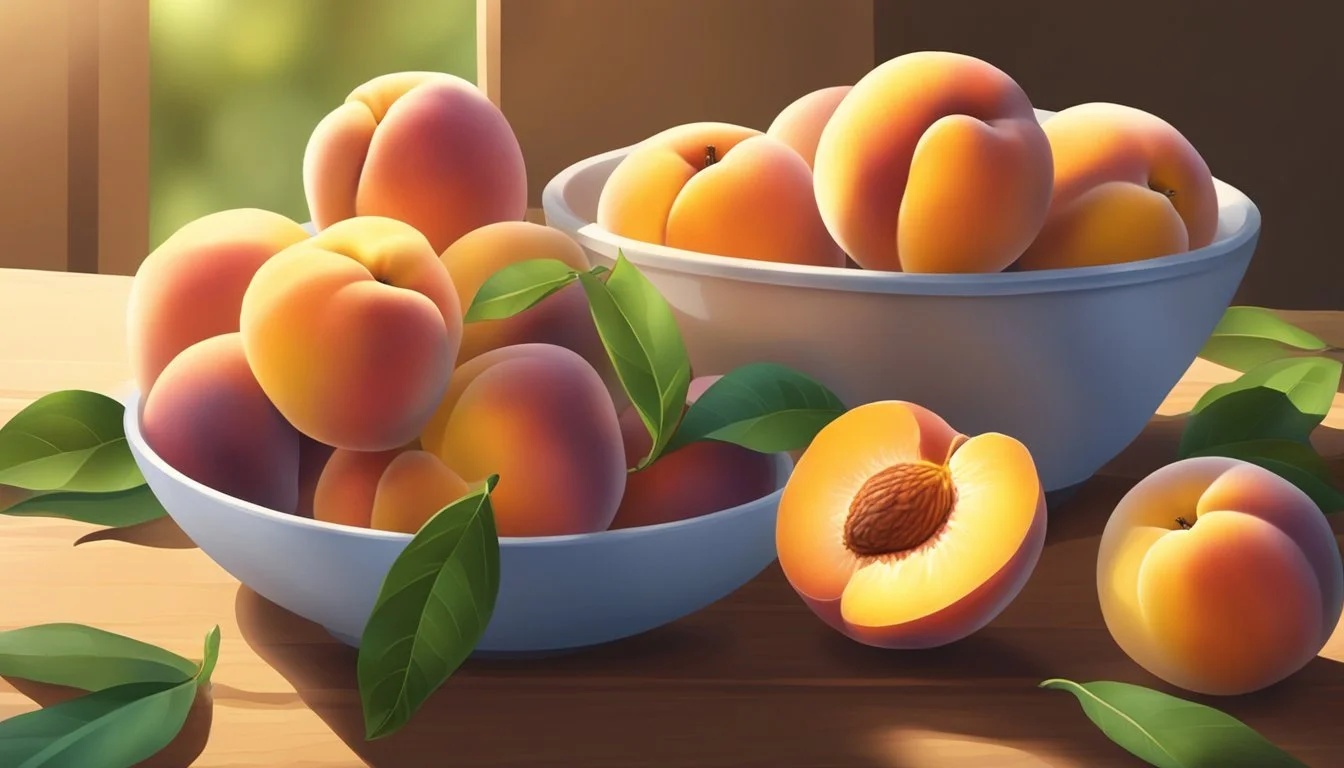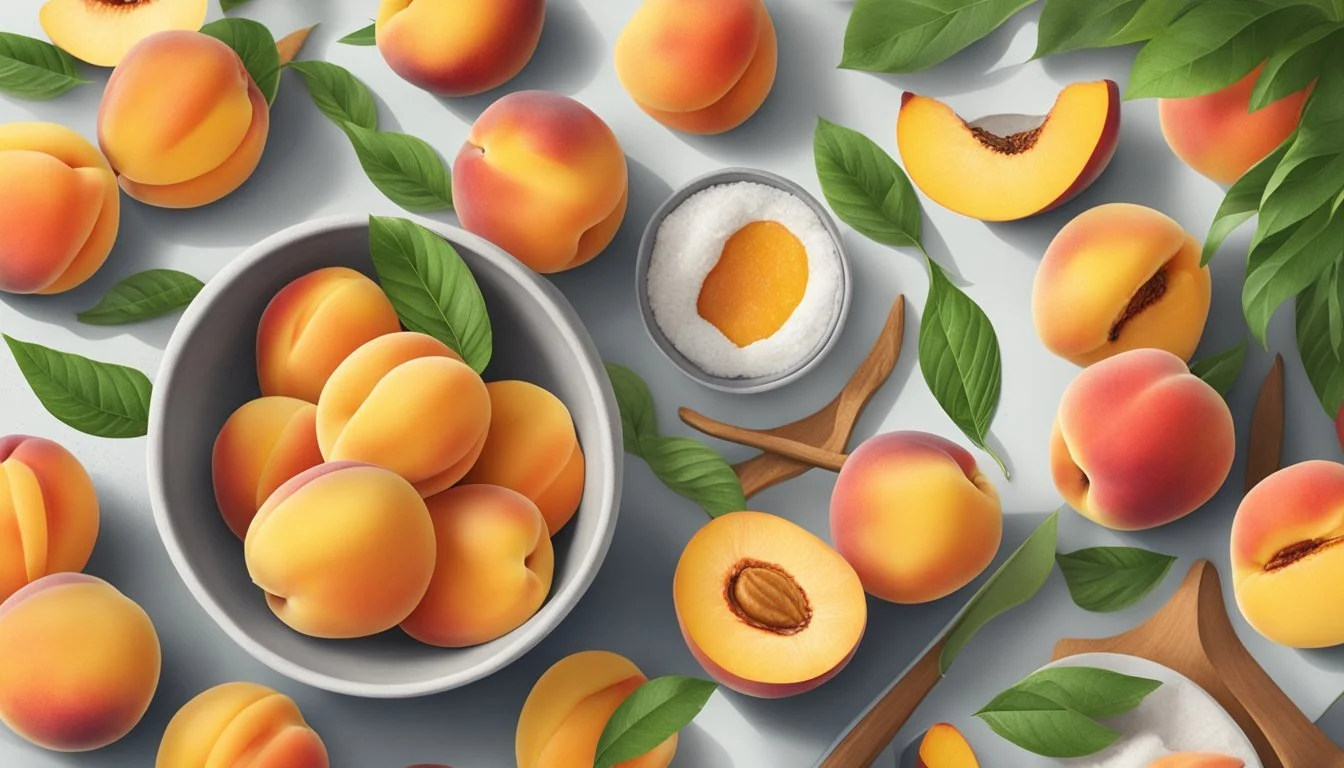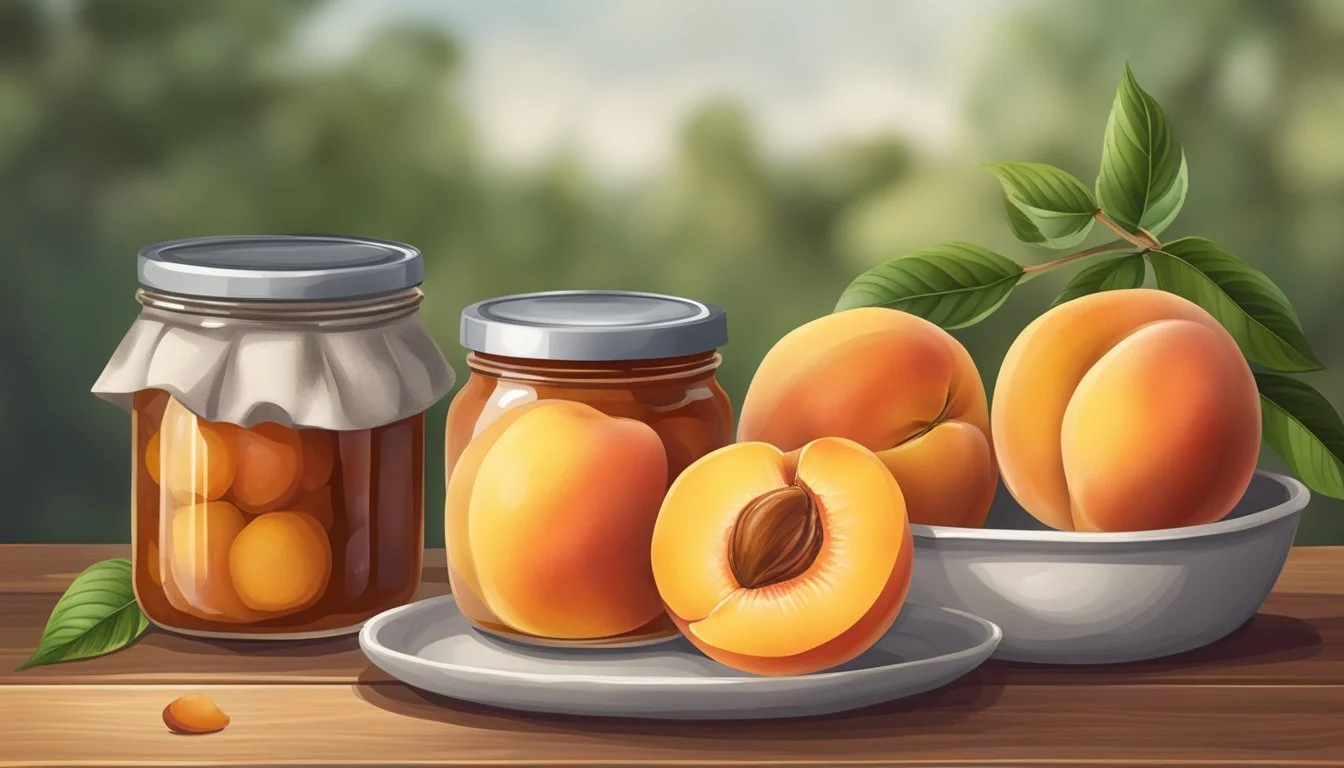Peaches Substitutes
Best Alternatives for Cooking and Baking
Finding the perfect substitute for peaches can be essential, especially when they are out of season or unavailable at your local grocery store. Pineapple emerges as a versatile alternative, boasting a similar texture and juiciness to ripe peaches. For a simple and effective switch, diced pineapple can be added to fruit salads, toppings for yogurt or oatmeal, or even grilled for a sweet and savory twist.
Another excellent contender for substituting peaches is pomegranates. Though distinctly different in taste, the size and firmness of pomegranates make them a unique replacement. Pomegranates impart a tart and tangy flavor, contrasting yet complementing dishes that typically call for the sweetness of fresh peaches.
Frozen peaches can be a convenient option when fresh peaches are not at hand. Use one pound of frozen peaches for every three peaches called for in a recipe. Canned peaches, typically packed in 16-ounce cans, also serve as a reliable substitute. These options ensure that the delightful essence of peaches remains accessible year-round, making your culinary creations both flexible and flavorful.
Understanding Peaches
Peaches, a beloved stone fruit known for their juicy flesh and sweet flavor, come in a variety of species and offer numerous nutritional benefits. The peak season for peaches is crucial to enjoy the best flavor and texture.
Varieties of Peaches
Peaches are primarily classified into freestone and clingstone varieties.
Freestone peaches have pits that easily separate from the flesh, making them ideal for eating fresh and baking. Clingstone peaches, with pits that cling to the flesh, are often used for canning.
There are also yellow peaches, known for their traditional sweet and slightly tart flavor, and white peaches, which are sweeter and have a lower acidity. The skin of peaches can be fuzzy or smooth, depending on the subspecies.
Nutritional Profile
Peaches provide a balanced nutritional profile, making them a healthy fruit option. A medium-sized peach contains approximately 59 calories and about 2 grams of fiber.
They are rich in vitamin C, vitamin A, and several B vitamins. Peaches have a moderate sugar content, contributing to their sweetness. Their nutritional makeup not only supports overall health but also provides antioxidants that help combat oxidative stress.
Peak Season and Selection
The peak season for peaches runs from May to late September. During this period, peaches are most flavorful and readily available at farmers markets.
A ripe peach feels slightly firm yet gives a bit when gently pressed. The skin should be free from blemishes and gaps, with a rich color indicating ripeness. Avoid peaches that are overly hard or have greenish tones, as these are signs the fruit was picked before it fully ripened. 🍑
Choosing Peach Substitutes
Selecting an appropriate substitute for peaches involves considering flavor profiles, textural similarities, and nutritional content. Some fruits offer a close match in sweetness and juiciness, while others share a similar texture or nutritional benefits.
Similar Flavor Profiles
Several fruits can mimic the sweet, juicy flavor of peaches. Nectarines are a top choice due to their almost identical taste and texture, minus the fuzzy peel. Apricots present a slightly tarter option with a comparable sweetness, especially when fully ripe.
Plums and mangoes also serve as good alternatives, offering a balance of tart and sweet, with plums bringing a more pronounced tartness. Pineapples contribute a tropical note and can be diced for fruit salads or desserts. The choice depends on how closely you want to match the peach's natural sweetness.
Texture Considerations
The texture of substitutes is crucial. Nectarines again stand out because their firm, juicy flesh mirrors that of peaches. Mangoes offer a soft, fibrous texture that works well in cooking and fresh applications. Canned peaches can substitute for fresh ones, especially when drained and used in baked goods or desserts.
Plums and apricots tend to have a firmer texture, particularly when not fully ripe. This can add a pleasant bite to salads and other dishes. Grilling or cooking these fruits can soften them, making them functionally similar to peaches in recipes that call for a tender fruit component.
Nutritional Similarities
From a nutritional standpoint, peaches are low in calories and rich in vitamins A and C, and fiber. Nectarines offer almost identical nutritional value, making them a near-perfect substitute. Mangoes provide more calories and sugars but are also rich in vitamins A and C and dietary fiber.
Plums and apricots supply similar fiber content and vitamin benefits, with apricots offering slightly higher levels of iron and potassium. Pineapples may not match in calories or fiber, but they are packed with vitamin C and bromelain, an enzyme beneficial for digestion.
Choosing based on nutritional content ensures that health benefits are maintained when substituting for peaches in your diet.
Substitutes in Recipes
When peaches are unavailable, various fruits can effectively replace them in recipes, providing similar textures and flavors. Depending on whether one is baking, cooking, or preparing savory dishes, different substitutes work best.
Baking Alternatives
For baking, fruits that mimic the sweetness and texture of peaches are ideal. Nectarines are a close relative to peaches and can be substituted one-for-one in pies and desserts. Apricots and plums are also excellent choices; they blend well in cakes and tarts. Frozen peaches can be used when fresh peaches are out of season. Simply thaw and drain before incorporating them into the batter. Canned peaches offer a convenient option, but be sure to drain them to avoid excess moisture.
Cooking Variants
In cooking, fruits that balance sweetness with slight acidity can be used. Pineapple provides a tropical twist and works well in salsas and sauces. Mangoes and papayas add an exotic flavor, making them suitable for chutneys. Apples and pears can be used in stovetop recipes like compotes and cooked fruit mixtures. When substituting, adjust the sugar in the recipe to balance the natural sweetness of these fruits.
Peaches in Savory Dishes
In savory dishes, fruits that complement meats without overpowering them are ideal. Plums and apricots add a subtle sweetness to pork and poultry recipes. Nectarines can be used in dishes such as grilled pork or duck. Pineapple pairs excellently with seafood, providing a tangy contrast. Papayas can be used in marinades, while pears offer a delicate flavor for chicken and salads. Adjust seasoning and cooking time based on the substitute's firmness and juiciness.
Non-Fruit Alternatives
When fresh or dried peaches are not available, there are various non-fruit alternatives that can replicate the sweet or tart flavors in recipes. Two main categories include dried fruits and sweet syrups and compotes.
Using Dried Fruits
Dried fruits can offer comparable flavors and textures to peaches. Dried apricots are an excellent substitute with their sweet and slightly tart flavor. They can be chopped or pureed to replace peaches in desserts or savory dishes. Raisins and dried pears also work well in adding sweetness and a chewy texture, making them suitable for baked goods or salads.
For a different flavor profile, try dried apples. Their sweetness can balance out more savory recipes like pork dishes.
Sweet Syrups and Compotes
Sweet syrups and compotes can replicate the juicy texture and flavor of peaches. Honey can be drizzled over dishes to enhance sweetness, while maple syrup provides a deeper, richer flavor. Both options are versatile and enhance the overall taste of various recipes.
Apple syrup offers a blend of sweetness and tartness, mimicking the natural sugar content found in peaches. Compotes made from apricots or pears are also valuable alternatives, as they provide a fruit-forward flavor that complements both sweet and savory dishes. These options are especially useful in baking and as toppings for pancakes or waffles.
Non-Food Substitutions
When substituting peaches, the focus can shift to visual appeal and cooking techniques that mimic peaches' properties.
Aesthetic Substitutes
To maintain the aesthetic appeal of peaches in dishes like smoothies, sauces, or salsas, consider other fruits with similar colors. Apricots and nectarines offer a close match in color and can be used sliced or diced. Their vibrant hues keep dishes visually appealing.
For canned recipes, canned apricots or mixed fruit can provide the same colorful allure. Using fruit molds or shaping tools can also enhance presentation, preserving the dish’s visual charm.
Culinary Techniques
In the kitchen, specific methods can replicate the texture and flavor profile of peaches. Grilling fruits like nectarines or apricots can develop a similar sweet, caramelized taste. These fruits hold up well under heat, making them ideal for recipes where texture is key.
For smoothies and pureed dishes, blending canned peaches with a touch of honey emulates the natural sweetness of fresh peaches. Sauces and salsas can benefit by incorporating a mix of apricots and a splash of fruit juice to mimic the juiciness of peaches.
In canning applications, substituting with apricots or mixed fruit ensures both visual and textural consistency, making them excellent stand-ins. These techniques ensure the dish not only tastes right but also retains its intended look and feel.
Pairing Ingredients with Substitutes
Pairing substitutive ingredients with complementary flavors and maintaining desired textures and consistencies are crucial in achieving delicious recipes. Knowing which ingredients go well together can elevate your dishes to another level.
Complementary Flavors
When substituting peaches, considering the flavor profile of the alternative fruit is key. Apricots possess a sweet and slightly tart taste, which allows them to stand in seamlessly for peaches in fruit salads and salsas. They pair well with ingredients such as berries, honey, and lemon juice.
For those substituting with persimmons, the warm spice palette makes it ideal for baked goods like cobblers and tarts. Ingredients such as cinnamon, nutmeg, and cloves amplify their flavor, adding depth to both sweet and savory dishes.
Textures and Consistencies
Apricots have a similar texture to peaches, with tender flesh that holds up well in grills, salads, and desserts. Their juicy consistency works effectively in dishes where peaches' fuzz and skin are typically used. This makes apricots an excellent substitute in fruit crisps or cold soups.
Persimmons, boasting a smooth skin, adapt well in dessert sauces and fruit crisps. Their firmer texture needs slight adjustments in sugar content when used in recipes like cobblers. Reducing sugar by about 25% balances the sweetness, ensuring the dish isn't overly saccharine.
By considering the complementary flavors and tweaking textures, substitutes like apricots and persimmons can enhance the culinary experience, making your dishes both delightful and consistent in taste and texture.







